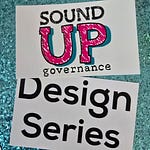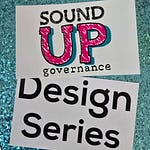TRANSCRIPT:
Matt (VO)
Welcome back to a regular old episode of Sound-Up Governance...Not! You guessed it, this is the second episode of... ArguMatt(?) where, as promised, I'm trolling myself. There's a lot of juicy stuff to choose from considering how much corporate governance content I put out there before even having a confident understanding of what good governance meant. Let's start with a series of quote/unquote "toolkits" for the governance of small- and medium-sized enterprises that I wrote for the Clarkson Centre for Board Effectiveness (CCBE) back in 2011, when I was a spry 31 year old who'd read about 20 million words about boards of directors, but had only met like 10 of them in real life. The first (cough) toolkit was called "Optimizing Board Skills and Meeting Effectiveness," which I apparently thought I could do in six pages, including a one page introduction, a bibliography and some really hard to read charts. Here's an excerpt.
Dana
How large organizations do it: Most large cap boards are strongly focused on strategic guidance and independent oversight. As a result, compared to SME boards, larger firms have less need for industry expertise at the board level. Instead, they prize practical professional backgrounds and executive experience. Moreover, in 2009, CCBE found that SME directors feel they would benefit from greater strategic focus at board meetings. If achieved, this shift would align the focus of SME boards more closely with larger firms
Weird Echo Voice saying "Reaction!"
Reaction!
Matt (Reaction)
Oh man, this is already so painful. I mean, it's just very clear how naive I was at the time. And I also really like that I was given enough leeway in my job to put out something called "Optimizing Board Skills and Meeting Effectiveness," as if those are the two things that you should choose to put together in some kind of toolkit, which obviously you can tell is completely bereft of tools. And I was clearly I hadn't figured out anything yet. Because first of all, I was implying that every board didn't want to spend more strategic focus at their board meetings, because this, you know, that's still a problem, even however, many years later. But also, okay, hey, look, let's add, what did I put it's industry, it "not industry expertise, but rather practical professional backgrounds and executive experience." Oh, there's a recipe for greater strategic focus at board meetings. Let's get a bunch of executives in the room. I mean, I'm not knocking executives. But we all know that if we put a whole bunch of CEOs in a boardroom, the last thing that's going to happen is a bunch of strategic discussion. Anyway. So this is clearly all really bad. Let's move on. Oh, before we move on, I was just about to, why does it what made me think that SMEs would care about a comparison to larger firms? I should get over myself, this is really bad.
Matt (VO)
The second Toolkit, which was just as not full of tools, as the first was called "Creating your board manual." A riveting subject to be sure, and one that answers an age old burning question. Because you're dying to know. why don't we share the headings that I thought were critical to include in your awesome board manual?
Dana
Legal descriptions
Strategic plan
Board organization/operations
Programs/products and marketing
Finance/fundraising
Public/community relations
Personnel and policies
Weird Echo Voice saying "Reaction!"
Reaction!
Matt (Reaction)
Oh, yeah, you just know that every director who gets a board manual with all the important legal descriptions is guaranteed to be set up for success. I mean, look, I think what might have been going on here is I hadn't quite... it's like I hadn't gone through my governance puberty yet. It was at the at the time where I thought I needed to find examples of stuff in the real world and whatever examples I found as long as they were being used in the real world, that must mean that they're good or rooted in some kind of appropriate practice. When I think what really what we need out there are ideas of how to do things actually well! Instead of just examples of what's happening and... legal descriptions, finance and fundraising. I mean, yeah, we need to know all that stuff. What they really what I should have put in this board manual is "how to do your job well." You know what I mean? Like put some stuff in the board manual that actually inspires your board to walk in the room and do some cool stuff? That would be a cool idea.
Matt (VO)
Finally, we have toolkit number three executive succession planning. This incredible specimen features the only known public documentation of the first corporate governance catchphrase I ever came up with on my own: "Regular, Repeatable and Rigorous." It was my brilliant and alliterative attempt at helping directors and executives to test whether their boardroom processes were sufficiently formal. Something we all should be worried about for sure. To help readers along, here's what I had to say about the "rigor" part.
Dana
Rigor: the overall goal of the succession process, for example, developing and maintaining a list of realistic successors, should be articulated clearly and in sufficient detail to be understood and executed effectively. Each step of the process as well as the desired outcomes of the steps should be clearly defined and placed into an annual cyclical schedule. These definitions should include executable processes for achieving seamless leadership, and may take into consideration broader organizational concerns such as development or training, cultural consistency and strategic compatibility.
Weird Echo Voice saying "Reaction!"
Reaction!
Matt (Reaction)
Did you catch it? Do you remember in the previous episode of BelittleMatt or whatever we're calling it I dragged poor Robert Monks and Nell Minow for their their awful sentence with the system for a system a system kind of thing. I might have been a little bit more subtle in my delivery, but here I'm talking about a process where each step of the process has to be and the outcomes have to be clearly defined. And the definitions should include processes. It's just it's so silly. And even I'm thinking back to this, this alliteration that I came up with that I thought was so brilliant: regular, repeatable and rigorous. I thought, "how should boards know how to test whether their processes are formal enough?" And I used to put it in all of my slide decks for courses and speeches and consulting, thinking that I was giving people something that was so smart and memorable and useful. And I'm thinking now, "why does anyone care how formal the process is?" I mean, of course, we need some formality around boardroom stuff, that's fine. But as if this is where I was going to stake my claim as being influential and catchy and interesting. This is really depressing.
Matt (VO)
Just in case you're wondering, you can still find these toolkits in the publication archives of what is now the David and Sharon Johnston Centre for Corporate Governance Innovation. I know you'll find them not just informative and supremely helpful, but also truly impossible to put down. So the last thing I'm going to troll myself on is one I literally just found right now. It's a report for a very early client of mine back when I was a 20-something. It might have even been the first time I flew solo with a client, which is a bad move on their part. I can't share the client details, but I can share with you the entire contents of a recommendation slide from my presentation to their board. Just so you can picture it in your mind's eye, It's an all white blank slide background and classic Microsoft Office staple Calibri font. The four bullet points are suddenly highlighted in a conservative dark blue color. If I had to choose a single word to describe the visual impact, it would be "riveting." Here's what the slide says.
Dana
Looking forward, the board's focus should be narrowed to oversight of the following areas:
Management
Strategy
Risk
Financials
Identification and selection of new directors should focus on capabilities in these areas.
Weird Echo Voice saying "Reaction!"
Reaction!
Matt (Reaction)
Yeah, let's just zero our focus in laser tight on management, strategy, risk and financials. Oh, I mean, you know, I definitely I think what I'm feeling now is I'm just sort of feeling bad for my past self. I don't feel embarrassed about it, but I feel bad for that person who was sitting there in that room with those directors of a real organization, really believing that I was telling them something that could help them. So to that organization and every other organization who hires people to tell them stuff about governance, you can do better than that. If your consultant or whatever book you're reading or course you're taking tells you something that to you seems really dumb, it probably is. It's not you. That was legitimately really, really, really very bad.
Matt (VO)
On the next episode, we'll be back to a more normal format. Part of what I'm trying to do with these reaction episodes is to encourage you to be as mercilessly critical of the governance experts in your world as I am of myself and the others in my community. It's important for us all to be better communicators, thinkers and advisors. Let's raise the bar a bit or maybe a lot and try not to take ourselves too seriously in the process. If you have any ideas for future episodes, reaction subjects or guests shoot an email or voice memo to soundup@groundupgovernance.com Thanks for listening.
Dana
[Hilarious outtakes and giggling














Share this post